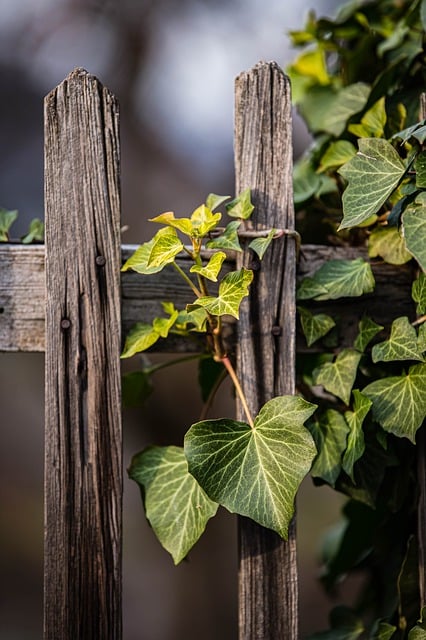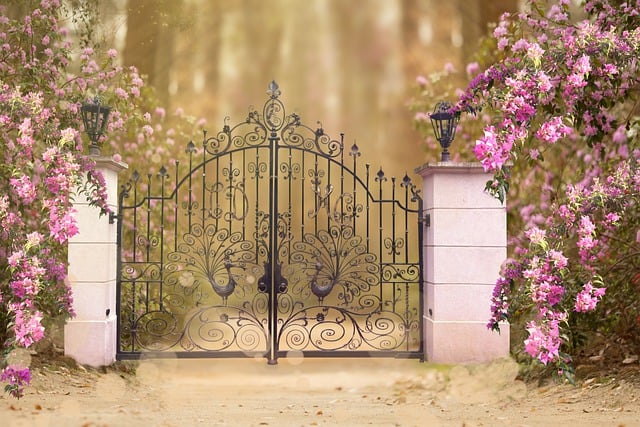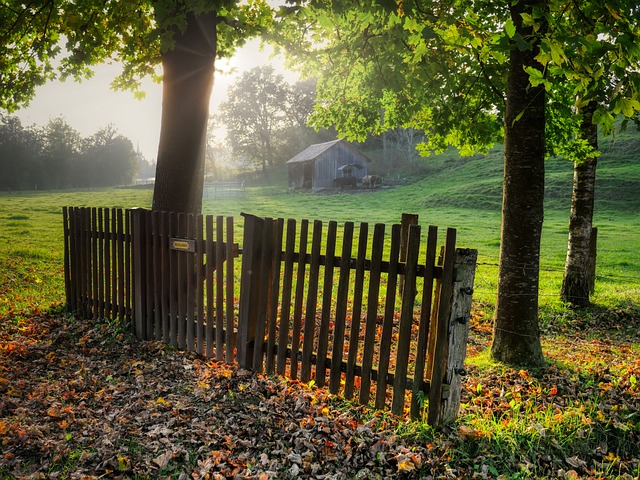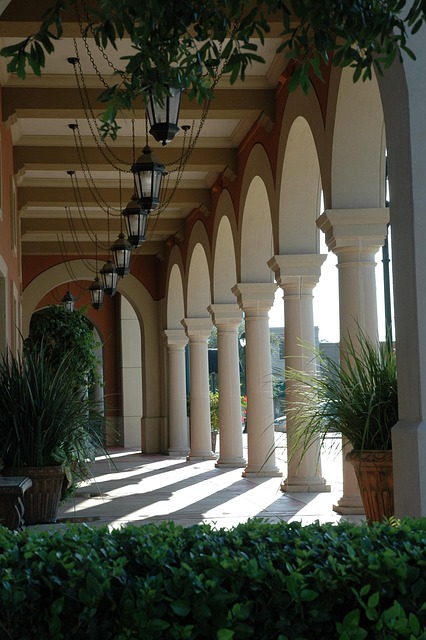When selecting a fence for your property, it's crucial to consider factors like material durability, maintenance requirements, and budget. Wood fences offer natural charm but necessitate regular treatment against rot, pests, and weathering. Metal options, including iron/steel and aluminum/wrought iron, vary in corrosion resistance and complexity of installation; they all may need specialized treatments to prevent rust. Vinyl fencing is a low-maintenance choice, resistant to environmental factors and typically backed by a manufacturer's warranty for longevity. A seasoned fence contractor plays an integral role in guiding you through these options, ensuring that your choice not only aligns with your property's specific needs but also enhances its security and aesthetic appeal over time. Regular upkeep is essential for all types of fences: wood requires annual inspections and treatments, metal fences need cleaning and corrosion protection, and vinyl fences benefit from periodic cleaning to maintain their appearance. A professional fence contractor can assist with maintenance schedules and hardware checks, ensuring your fence remains a reliable boundary for years to come. Their expertise is invaluable in addressing the unique challenges of each material and adhering to industry best practices and safety standards.
When safeguarding your property or enhancing its appeal, selecting the right fencing material is pivotal. This article delves into the distinct characteristics of wood, metal, and vinyl fencing materials, guiding homeowners through the decision-making process. From durability and maintenance to cost implications, understand how each material stacks up. Additionally, discover the importance of engaging a professional fence contractor for expert installation and adherence to best practices. Whether you’re aiming for timber’s classic charm, metal’s robust security, or vinyl’s low-maintenance allure, this comprehensive guide ensures your investment endures and complements your home’s aesthetic for years to come.
- Assessing Your Property for Wood, Metal, and Vinyl Fencing Needs: A Guide for Homeowners
- Comparison of Wood, Metal, and Vinyl Fencing Materials: Durability, Maintenance, and Cost Considerations
- The Role of a Fence Contractor in Installing Wood, Metal, and Vinyl Fences: Expertise and Best Practices
- Maintaining Your Wood, Metal, or Vinyl Fence: Tips for Long-Term Performance and Aesthetics
Assessing Your Property for Wood, Metal, and Vinyl Fencing Needs: A Guide for Homeowners

When considering fencing options for your property, it’s crucial to evaluate the unique characteristics and requirements of your land. Wood fences exude a natural charm and are ideal for blending with nature, providing privacy while maintaining an aesthetic that complements various home styles. Before committing to wood, assess factors such as local climate conditions, moisture levels in the soil, and the prevalence of pests, as these can impact the longevity and maintenance needs of your wooden barrier. Engaging a skilled fence contractor at this stage can offer valuable insights into the best wood types and treatments for long-term durability.
Metal fencing, on the other hand, offers robust security features and requires minimal upkeep compared to its wooden counterpart. Aluminum and steel are popular choices due to their strength and resistance to rot and pests. Vinyl fencing is another low-maintenance option that boasts a sleek, modern look. It’s resistant to environmental elements like wind, sun, and moisture, and doesn’t suffer from the same decay issues as wood. When opting for vinyl, consider factors such as UV stability and the manufacturer’s warranty to ensure longevity and quality. A proficient fence contractor can guide you through these choices, helping you to weigh the pros and cons of each material in relation to your property’s specific needs. Whether you prioritize aesthetic appeal, durability, or ease of maintenance, a professional contractor can help you make an informed decision that will enhance both the security and curb appeal of your home for years to come.
Comparison of Wood, Metal, and Vinyl Fencing Materials: Durability, Maintenance, and Cost Considerations

When considering the installation of a fence, homeowners and property managers alike must weigh the durability, maintenance requirements, and associated costs of various materials. Wood fencing, with its natural aesthetic and biodegradable nature, offers a traditional charm that is hard to replicate. It requires periodic upkeep to protect against rot, pests, and weather damage, making it a choice that involves ongoing attention from a skilled fence contractor for staining or painting and repairs. Metal fencing, on the other hand, presents an option that ranges from iron or steel, which may require galvanizing or rust prevention treatments, to aluminum or wrought iron, which are more resistant to corrosion but still demand a professional’s expertise in installation for optimal longevity. Vinyl fencing, known for its low-maintenance properties, is highly durable against environmental factors and doesn’t succumb to the same issues as wood. A fence contractor specializing in vinyl can attest to its longevity, as it often comes with a manufacturer’s warranty, reducing long-term costs. Each material has its unique set of benefits and challenges, and the choice largely depends on the specific needs, climate, and budget of the project. Homeowners should consult with a reputable fence contractor to evaluate the pros and cons of each material type to determine which fencing solution best aligns with their property’s requirements and their personal preferences.
The Role of a Fence Contractor in Installing Wood, Metal, and Vinyl Fences: Expertise and Best Practices

When it comes to installing fences crafted from wood, metal, or vinyl, a skilled fence contractor plays an indispensable role in ensuring the durability, functionality, and aesthetic appeal of the barrier. These professionals bring a wealth of knowledge and experience to the table, adept at navigating the unique challenges each material presents. For instance, wood fences require a deep understanding of various wood types, their resistance to weather elements, and proper treatment to extend their lifespan. Metal fencing, on the other hand, demands expertise in corrosion-resistant materials and techniques to withstand environmental factors effectively. Vinyl fences benefit from a contractor’s familiarity with the material’s expansion and contraction properties, as well as the best methods for secure anchoring to prevent warping over time.
In every installation project, a fence contractor employs industry best practices, which include meticulous site preparation, precise measurements, and careful alignment of posts and rails. They are also well-versed in local building codes and regulations, ensuring compliance for permits and safety standards. Moreover, they assess the property’s terrain and conditions to recommend the most suitable fencing material, taking into account factors such as privacy needs, maintenance requirements, and budget constraints. Their commitment to quality workmanship and attention to detail ensures that each fence installed is a testament to their craftsmanship and an enduring asset for property owners.
Maintaining Your Wood, Metal, or Vinyl Fence: Tips for Long-Term Performance and Aesthetics

Regular maintenance is key to ensuring your wood, metal, or vinyl fence remains both functional and visually appealing for years to come. For wooden fences, annual inspections are crucial to catch any signs of rot, pest infestation, or weather damage early on. Use a high-quality wood preservative and stain or paint to protect the wood from the elements, which can enhance its longevity and maintain its aesthetic appeal. If you notice any issues, prompt repairs by a skilled fence contractor are essential to prevent more extensive damage.
Metal fences, whether wrought iron or chain link, require attention to avoid rust and corrosion. Regular cleaning with a mild detergent solution followed by a protective coating can shield your metal fence from the harsh effects of outdoor elements. Rust spots should be sanded and treated immediately to prevent spread. Vinyl fences, known for their durability and low maintenance requirements, still benefit from occasional washing to remove dirt and grime. Check for any cracks or signs of wear, addressing them promptly with the help of a professional fence contractor to ensure your vinyl fence continues to provide privacy and security for years. Regardless of the material, always inspect hardware such as hinges, latches, and gates, ensuring they operate smoothly and securely. A fence contractor with expertise in various materials can offer tailored advice and maintenance schedules to suit your specific needs, ensuring your investment endures and retains its beauty.
When considering the installation of a fence, understanding the unique properties of wood, metal, and vinyl materials is paramount. Homeowners can reference the guide provided for assessing their property’s specific needs, compare the durability, maintenance, and cost factors associated with each material, and appreciate the value of partnering with an experienced fence contractor. This comprehensive overview underscores the importance of making an informed decision that balances aesthetics, budget, and longevity. By considering the insights into the installation process and long-term maintenance tips outlined in this article, homeowners are well-equipped to choose the most suitable fencing material for their outdoor space.



